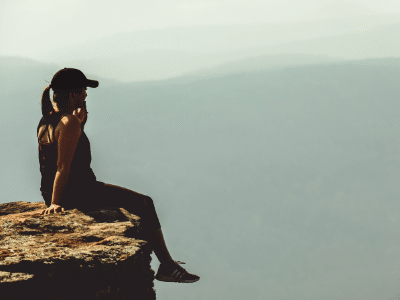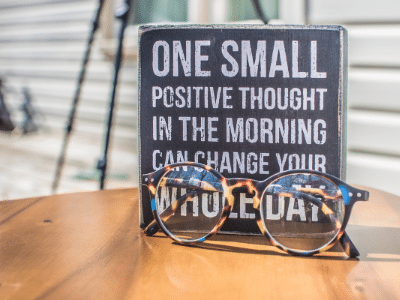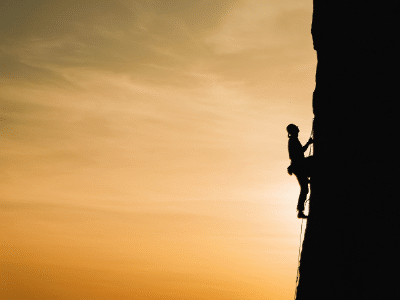

Do you consider yourself a brave person? While you can no doubt remember times you were courageous, if you're like most of us then you know that fear sometimes holds you back.
For example, perhaps you can recall times when you declined opportunities because you didn't want to take risks. While it's understandable that you want to stay safe, if you're going to grow as a person then you need to be able to tap into courage at crucial times. But how do you become brave enough to face your fears?
First, we'll take a detailed look at the nature of bravery, exploring some of its necessary ingredients.
Next, we'll flesh out what being brave actually involves, with reference to four of the most significant things that brave people can do.
Finally, we'll turn to unpack six kinds of courage you can draw on in order to become braver in all aspects of your life.
You may have simply assumed that bravery is an attribute. In other words, it's something you're born with, and if you lack it then that's too bad.
However, the latest understanding that psychologists and neurologists have of bravery suggests that bravery is more like a skill. In other words, it can be learned or honed over time.

Another understandable assumption you may have made is that bravery and courage are just the same things.
However, when we look at bravery vs. courage, we can see at least one notable difference.
In particular, the brave person faces difficulty or pain without fear. In contrast, the courageous person does feel fear but is able to push past it and take risks regardless.
Many of the things we explore in this article can be scary – but if you develop courage and exercise that courage over time, everything gets easier.
In time, through practicing courage, you become an increasingly brave person.
So, what do you need to do?

We'll look at specific forms of courage shortly, and talk about how you can tap into them. Before that, let's think about two things you can do immediately to start learning how to be brave.
The first is to follow your heart. In short, following your heart means going with your gut or following your intuitions. For example, sometimes we just get a feeling that something is good for us, or that we shouldn't do something, in spite of there being no logical evidence for this urge.
Almost always, our subconscious knows things that our conscious mind can't perceive – and so there is actually evidence for what our heart feels, it's just hard for us to access that information.
To learn to be brave, challenge yourself to go with that gut instinct more often. Start with small risks, and notice how often you get it right. In time, work up to taking bigger chances.

The other immediate change you can make if you want to be brave is to step out of your comfort zone. For example, suppose you're invited out with a new group of potential friends and you feel a little nervous that you'll be awkward or people won't like you.
Staying in your comfort zone would mean turning down the invitation. But moving out of that comfort zone would mean taking the risk that you might be a little uncomfortable in order to make new friends.
Our comfort zone certainly feels safe, but it can also become incredibly stagnant over time. To prove this, think about times that you did something that felt scary, and notice how pivotal that thing turned out to be for your development.
To learn more about yourself, hone your skills, and make life more exciting, try to do things outside of your comfort zone every single day.
You now have a sense of the difference between courage and bravery, and you're equipped with two basic ideas you can use to start being braver today.
However, it's helpful to think a bit more about the kind of person you're trying to become. Here, then, are four things that brave people do.

Brave people don't start out with an innate understanding of bravery. Rather, they see it around themselves somewhere, and they emulate it until they become it.
In the spirit of this idea, try to think of who you want to view as a bravery role model. Don't feel you need to restrict yourself to just one. For example, perhaps you might choose one person from your own life and a second person who is in the public eye.
These figures will serve as inspirations when being brave seems hard or confusing.
Once you've got your brave people in mind, reflect on how they got to where they are, and what their bravery looks like in everyday life.
How can you do similar things in your own life? How do their traits and habits translate to your particular context? If you can ask your role model(s) for advice as you develop, so much the better.

Few things are more intimidating than an enormous goal. For example, the thought of changing careers, facing a phobia, or getting fit can feel insurmountable.
It's hard to be brave when it feels like there's such a huge difference between who you are and the person you want to be.
However, brave people often apply a particular trick here – splitting large goals into smaller sections.
The thought is that you end up with a list of sub-goals, each one of which is less scary than the big goal.
To take an example, suppose you want to start a business within the next year, and you find it hard to take action.
You might split it into subgoals like networking, speaking to a financial advisor, creating a site, researching a location, etc. These small goals aren't so scary, and each time you accomplish one you get concrete evidence that you're making real progress.
As we mentioned before, brave people face challenges without feeling intense fear. However, to become brave, they first had to exercise courage, and that means accepting that fear is part of life.
In other words, instead of hiding from difficulty, people who have the potential to be brave embrace challenges and risk. This doesn't mean you have to be ecstatic every time you do something nerve-wracking.
Embracing fear means something simpler. It's just that you have to acknowledge fear as what it is – a positive sign you're doing something important and developing in a new way.

Finally, brave people are typically positive individuals. They know that being optimistic and looking for silver linings is empowering and helps you get the best results in life.
So, if you want to be a braver person, tell yourself to actively challenge negativity.
Notice when you're giving too much airtime to fear or to over-thinking, and redirect your attention.
Keeping a gratitude journal can help to change your perspective in this way.
Just write down 3-5 things that make you feel positive and grateful every day.
In time, your brain will start to be drawn to the positive (and away from the negative) more and more.
While you no doubt already have enough ideas to start an action plan for becoming braver, we'd like to offer one more suggestion.
In particular, it's illuminating to break the idea of courage down into several different types. Let's look at each, and consider how you might be able to exercise that kind of courage today.

Moral courage is the courage to do what's right. You're particularly morally courageous if you do the right thing even though you know people will disapprove or push back against you.
When you're morally courageous, you set a good example to others and reveal key aspects of who you are.
After all, it's more courageous to take a stand against opposition than it is to just repeat what others say.
How might you be morally courageous today? Perhaps you could stand up for someone who is being unfairly criticized.
Maybe you could refuse to laugh along with a joke that's cruel or targets a minority group. Or maybe you might tell your friend you can't support something they're doing.
Even just sharing an important piece of news on social media can help to educate others on what's right.

When you're intellectually courageous, you dare to engage with ideas that challenge you. You listen to others (or read what they say) even though it puts pressure on your own beliefs.
In addition, you choose to try and understand things that require time and effort, even when this is hard work.
How might you be intellectually courageous today? Try reading an article by someone you disagree with, or pull up a TED talk on a topic that's brand new to you.
Even just making a list of things you don't understand and what to learn about constitutes a kind of intellectual courageousness.

Physical courage might be the first thing your mind goes to when you think about bravery.
An image might come to find of someone putting themselves in physical danger to save someone else, or of someone standing up to a bigger bully.
However, physical courage can also just mean pushing your body past its comfort zone.
Trying to make it stronger, even when it's not physically comfortable to do so.
With reference to this last example of physical courage, you might try a more challenging workout today.
Another idea is to sign up for a self-defense class – this serves the dual purpose of strengthening your body and making you more capable of protecting others.
Attempting to have a healthier, better diet is also a form of physical courage – avoid the easy and unsatisfying path of cravings.

When you exemplify emotional courage, you embrace and accept the full range of emotions. In other words, you let your defenses down and be honest with yourself.
This is a form of bravery because it means you might come face to face with difficult, uncomfortable, or downright painful emotions. However, emotional honesty also has a proven link with happiness.
When we let our feelings in, we learn more about ourselves – our needs, our desires, and our talents.
Being emotionally brave today might involve just writing a diary entry in a stream-of-consciousness style. This means writing whatever comes to mind, no matter what it is.
Alternatively, you could talk to someone in your life about something difficult, and let them see your real feelings about this topic, and enjoy the catharsis that follows.

Spiritual courage arises when we engage with the big questions in life. For example, when you reflect on life's purpose and meaning, or on mortality.
You might do this from a religious, atheistic, or agnostic standpoint.
This kind of courage challenges us to grapple with the fact that we are small, finite beings in a far wider universe, which can spark anxiety about the worth of our lives.
However, exercising spiritual courage can also help us clarify what is important to us – how we want to spend our time and energy.
If you want to be spiritually courageous today, think about what you take your life's purpose to be.
What can you contribute to the world? What do you want your legacy to be? Consider sharing these insights with someone else and reflecting on theirs.

Finally, social courage is what comes into play when we risk embarrassment or negative judgment.
You exercise social courage when you put yourself out there with a new person, letting them see you, and knowing you risk rejection.
You also display social courage when you share life experiences, perform in a public space, or put yourself in the running for a job or promotion.
Every day presents opportunities for emotional courage.
For example, you might reach out to someone you'd like to be friends with, and ask them if they want to grab a cup of coffee (in person or online).
Alternatively, you might take a risk in doing something in public that you find a little scary, such as joining a drama club or performing at an open mic night.
“You cannot swim for new horizons until you have courage to lose sight of the shore.”
-William Faulkner
“Bravery is the audacity to be unhindered by failures, and to walk with freedom, strength, and hope, in the face of the things unknown.”
-Morgan Harper Nichols
“Find your passion, love with every ounce of your bones, stand up for things that matter, don’t settle, don’t apologize for who you are. Be brave.”
-Anonymous
“Take chances, make mistakes. That’s how you grow. Pain nourishes your courage. You have to fail in order to practice being brave.”
-Mary Tyler Moore
“Be brave. Without bravery, you will never know the world as richly as it longs to be known. Without bravery, your life will remain small – far smaller than you probably wanted your life to be.”
-Elizabeth Gilbert
Now that you know what bravery and courage involve and how they promote happiness, why not take extra steps to become braver?
Our self-hypnosis program on building confidence can help you tackle things that scare you, from public speaking to relationship commitment and more.
By leading you into a relaxed state and changing old, outdated beliefs you have about yourself, self-hypnosis transforms how you feel about taking risks.
You will begin to view yourself as a courageous, capable, and valuable person for whom nothing is impossible. And this new mindset will help you live your best, most fulfilling life.
